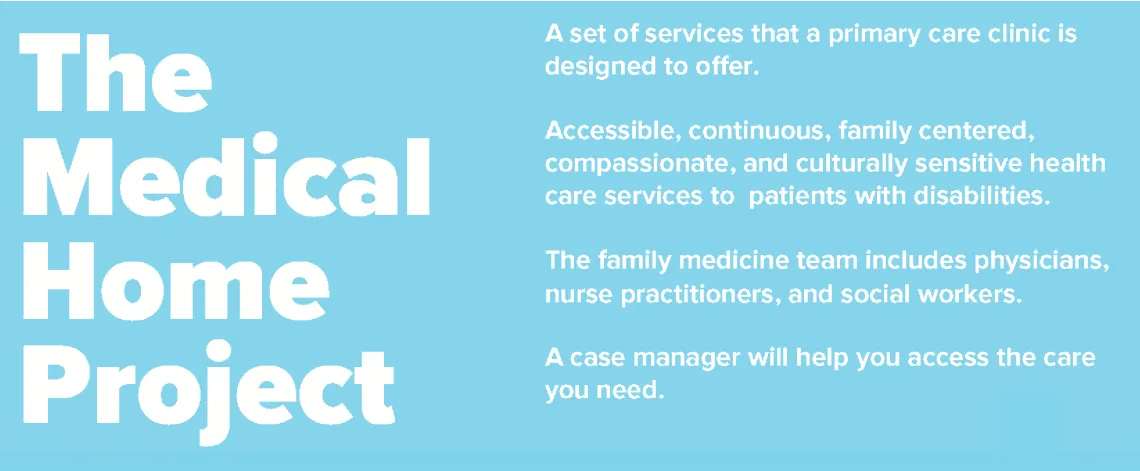Home is Where the Care Is
How the Sonoran Center Medical Home Project is Helping People with I/DD Feel at Home in Healthcare

Home is more than a place where someone lives. Home can be somewhere — or even someone — that lets us feel relaxed, accepted, and at ease.
The Medical Home Project is providing a place for people with intellectual and developmental disabilities (I/DD) to feel at home in the healthcare system. Rather than a place where someone lives, the Sonoran Center’s Medical Home Project is a program that connects people with I/DD to physicians who are specially trained to address their needs. This includes appointments in the clinic and home visits.
Dr. Tamsen Bassford, the program’s director, explains: “People with intellectual disabilities or communication differences may have barriers to getting care that’s appropriate for them: care that is both informed by knowledge of their disability, but is also not going to be overly focused on the disability and ignore the entire personhood.”
Other aspects of an individual’s care are addressed, such as a healthy lifestyle, diet, exercise, and sexuality, says Dr. Bassford. The Medical Home Project provides case management support, focuses on accessibility, and uses best practices for care of adults with developmental disabilities.
The complexities of the healthcare system can make it difficult to navigate for people with I/DD. This can lead to worse health outcomes, as these patients may miss routine appointments.
“Much of this difference in health outcomes lies in the area of chronic diseases such as diabetes, obesity, heart disease — things that are problems for people without disabilities, but that folks with I/DD suffer from at higher rates,” Dr. Bassford says. “Some of this is due to lower rates of screening examinations. Some of this is due to difficulties in accessing care.”
The Medical Home Project aims to simplify this process.
Another obstacle for people with I/DD in the healthcare system can, unfortunately, be doctors’ lack of confidence in providing treatment.
“A lot of physicians aren’t comfortable seeing people with I/DD or aren’t confident that they’re able to provide good care,” says Dr. Bassford “A recent study on attitudes among U.S. physicians uncovered that a little over half felt that they couldn’t offer the care that they wanted to offer to people with disabilities.”
This is part of what makes the Medical Home Project’s commitment to providing top-quality, disability-informed care so valuable.
The impact of the Medical Home Project is plain to see in the numbers as well.
Patients who participate in the program have significantly higher rates of preventative visits and checkups.
“We found that [our participants] had higher accessibility to… seeing a doctor to discuss or prevent a problem,” says Dr. Bassford. “We [also] reduced the number of visits for surgeries and diagnostic procedures, suggesting that improved access to cognitive visits reduced the need for emergency room visits and other diagnostic or surgical procedures.”
Not only does this provide better care for the patients who need it, it is also beneficial from a financial perspective.
According to Dr. Bassford: “This actually saved the payers [insurance companies] money, which is important when you think about whether this is a project that could be sustainable. It could be sustainable, if payers felt like they could save money by investing in case management fees for people with certain diagnoses.”
Another clear positive impact of the program is encouraging vaccinations among people with I/DD. People with I/DD may miss their vaccinations for several reasons, from difficulty scheduling an appointment to lack of knowledge of vaccine efficacy and safety. The Medical Home Project has demonstrated a sizable increase in the rate of vaccinations among its participants.
“Our influenza vaccine rate, for example, is very high, because we do outreach every year to help them make appointments to get their influenza vaccines,” Dr. Bassford says. “During the COVID-19 crisis, we kept our patients up to date with mailings about COVID vaccines and basic COVID safety measures.”
Dr. Bassford hopes the success of the Medical Home Project will encourage both the expansion of the current program, and the creation of similar programs in the future.
“One thing we’re trying to do is to model a program that will be more easily disseminated to a broad range of primary care practices — not just university practices, but community health centers and other primary care practices,” she says.
Looking beyond the immediate scope of the Medical Home Project, Dr. Bassford says that the lessons she and her colleagues have learned from the program will inform them in all their practices going forward.
“One of the things that you learn is that your patients are incredible sources of information on their own lives and things they’ve discovered to be helpful. Learn from your patients,” Says Dr. Bassford.
